Rachel Held Evans's Blog, page 48
February 23, 2013
Sister Shirley – A Woman of Valor
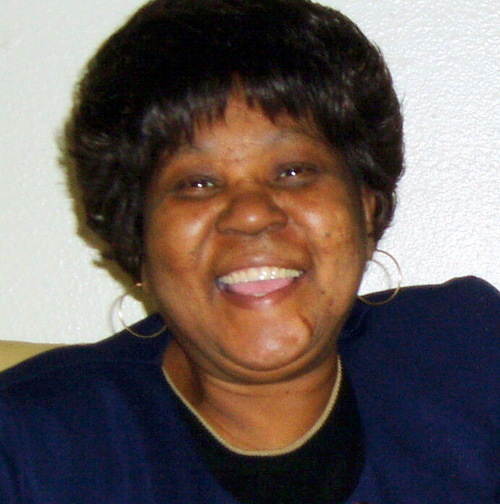
By Amanda Peterson
It was our usual Wednesday night gathering.
We gathered at Sister Shirley’s, filling her
small living room with our presence. Our church life group.
The place was rich with the aromas of
hot-off-the-stove soul food. The kind of soul food steeped in butter and rich
in Southern hospitality—Southern hospitality in the middle of Portland, Oregon.
Like she did every day, Ms. Shirley woke at
four in the morning, went to work, worked a gruelling shift and came home tired
to her great granddaughter, all of four years old and full of spunk and sass.
Wednesdays made for especially long days, when
coming home meant spunk and sass plus cooking and preparing her home to
receive.
But Sister Shirley wouldn’t have it any other
way.
She sometimes complained about our Wednesday
night gathering, but she knew if she gave it up, if she told anyone she didn’t
have the strength to host anymore, she would never come again.
Sunday mornings, her only day off of the week,
needed Sabbath solitude. They needed quiet and rest.
They did not need the heart-pumping stomp of
relentless praise that echoed through the neighbourhood and filled up our
two-story house church. They did not need the throngs of children, screaming as
they played on the front lawn. They did not need the orderly chaos of Sunday
morning church.
They needed quiet and Sabbath.
But Wednesday, Wednesday needed fellowship.
Wednesday needed Bible study. Wednesday needed prayer. Wednesday needed the
push to get her through to Sunday.
Wednesdays Shirley sat on her worn sofa, the
cushions so misshapen around her they barely looked like cushions anymore. She
gently rocked back and forth when she spoke, unconsciously rubbing her hands
across the scared track marks lining her arms. Her voice, scratched and deep,
told how she needed prayer to be able to love her boss and continue at her job
even when she wanted to quit, even when she knew God still wanted her there.
She asked for prayers for Woman at the Well, a small nonprofit she was starting
for women to do what others had done for her—take them off the streets, out of
prostitution and drug use and teach them about Jesus’ great love for them. And
she listened to Pastors Lanny and Steve—titles they never themselves used, but
she always insisted upon—she listened and she learned and she allowed them to
challenge her and to speak grace into her life.
Sister Shirley had, without me knowing it, taken me under her
wing-- a freshly plucked college graduate in Portland.
She taught me about relationship and valuing
relationships. She taught me what it meant to be poor and love Jesus. She
taught me what it meant to be in recovery and to give yourself wholeheartedly
to the One who rescued your life from the depths of the pit. She taught me
about grace and love and forgiveness. She taught me about faith in the
impossible.
On one of my last Wednesday nights before
leaving Portland and moving off to a new adventure, Sister Shirley looked at me
and told me how she mistrusted me at first, how I was young and arrogant and
how she thought “Lord, here comes another white person to tell the poor black
folk how to live.” Then she told me how she had changed her mind about me and
how she had seen my arrogance slowly humble. She told me she knew, no matter
where I went, among the poor I would always find a place, I would always be
accepted because of how I loved and how I accepted people like they are and
didn’t expect change.
It was the best compliment I ever received and
one I try to live up to.
Here was this woman of valor, a woman with a
past yes, but nonetheless a woman of valor, giving her life away so that women
like her could become even more like her in the pasts they leave behind and the
futures they see ahead—here she was telling me I belonged and would continue
belonging no matter where I was because of the way I loved. That way of love
learned from watching her and others like her.
Sister Shirley passed away a few years ago.
I like to think of her now, up in heaven, enjoying
a lifetime of Sunday Sabbaths and Wednesday gatherings. I like to think of her
sitting on Jesus’ couch, telling her story and asking her questions. I like to
think of running into her again one day, hugging her tight and laughing at the
long years passed. And I hope then, I hope this woman of valor will say to me,
“Amanda, just look how you belonged.”
***

Amanda is a Jesus follower, future adoptive
mom and a fledgling writer. She believes in living simply and loving radically
and is passionate about adoption and orphan care. You can read more from Amanda
atwww.AmandaErinPeterson.com,
follow her on Twitter at @AmandaEPeterson, and find her on Facebook here.
This post is part of our Women of Valor series. Eshet chayil—woman of valor— has long been a blessing of praise in the Jewish community. Husbands often sing the line from Proverbs 31 to their wives at Sabbath meals. Women cheer one another on through accomplishments in homemaking, career, education, parenting, and justice by shouting a hearty “eshet chayil!” after each milestone. Great women of the faith, like Sarah and Ruth and Deborah, are identified as women of valor. One of my goals after completing my year of biblical womanhood was to “take back” Proverbs 31 as a blessing, not a to-do list, by identifying and celebrating women of valor. To help me in this, you submitted nearly 100 essays to our Women of Valor essay contest. There were so many essays that made me laugh, cry, and think I’ve decided that, in addition to the eight winners we featured in August, I will select several more to feature as guest posts throughout the fall.
We have honored a single mom, a feisty professor, a midwife, a foster parent, an abuse survivor, a brave grandmother, a master seamstress, a young Ugandan woman who reached out to a sister in need, and many more.
Read t he rest of the Women of Valor series here.



February 22, 2013
Swords into plowshares and hate mail into origami

So I’ve been really inspired by Shane Claiborne and The
Simple Way’s recent efforts to bring Isaiah 2 to life by learning to weld so
they can turn guns into farming equipment. (Watch a video here; see more
pictures on Shane’s Facebook page.)
And I’ve been thinking that this idea of learning a new
skill so you can turn something ugly into something beautiful might be a
good Lenten practice. Whether it’s turning an AK-47 into a rake, an old tire
into a flowerbed, or trash into a work of art, there is something profoundly
fitting about struggling through the creative process with the goal of
finishing something new by Easter to provide a tangible, hands-on experience in
discipline, resurrection, and restoration.
This Lent, I’ve been praying for clarity and peace in regard
to loving my online “enemies.” While the overwhelming majority of
correspondence I receive is encouraging and positive, there is still a fair amount of hate mail in my inbox and ugliness in certain comment sections across the
blogosphere—an expected consequence of writing and speaking publicly, but
hurtful still. As much as I try to ignore the most vile of these
messages, they can still be quite painful, and I think that’s okay. It’s important
to grow thick skin, but I also want to
keep a tender, open heart….which means unclenching my fists and letting some of
these words hurt every now and again.
I mentioned on Facebook the other day that perhaps part of
my Lenten experience this year could include learning origami, so that I can
turn some of this hate mail into pretty birds and ships and kites. As I
struggle to learn the craft…(if you’ve read my book, you know that “struggle”
and “craft” always appear in the same sentence for me)….I can pray for those
who have hurt me, and ask for wisdom in responding to criticism with more grace
and peace.
A dear friend (and actual artist!) read that comment, and when I returned from my
trip to Kentucky yesterday, there was a box sitting by the front door that
included this amazing origami kit.

(Thank you, Melissa!!)
And so I’ve started my odd little Lenten practice. The best I can do so far is make a
simple swan…but hey, this is the girl who was almost held back in kindergarten
because of my outbursts during craft time, so I'm pretty proud.

It felt a little awkward at first, but as I moved my fingers across those painful words,
folding them into one anther to make wings, then a neck, then a crooked little beak,
healing tears fell, and I let my fingers pray.



February 18, 2013
Torn, Chapters 14-15 & Conclusion: The Way Forward
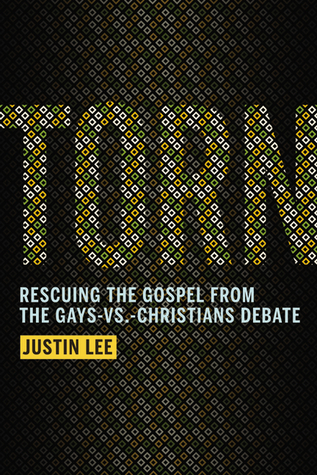
Today we wrap up our discussion around Justin Lee’s
fantastic book, Torn: Rescuing the Gospel from the Gays-vs-Christians Debate.
This has been a perfect starting point for our yearlong series on Sexuality and
the Church, which for the first quarter will focus specifically on
homosexuality.
Next week we will begin a shorter, 2-3 week discussion around
Wesley Hill’s Washed and Waiting: Reflections on Christian Faithfulness and Homosexuality. Like
Justin, Wesley is gay, but whereas Justin concluded that a relationship with
another man could be blessed by God, Wesley has chosen celibacy. I picked these
two books because I think Justin and Wesley represent the very best in civil,
gracious, and loving disagreement on this issue…which for them is not a mere
issue, but a deeply personal journey with deeply personal implications.
Now on to Torn, Chapters 14-15….
Chapter 14: Lightening RodAs Justin came to terms with his sexuality and what it meant
for his future, he began advocating on behalf of gay Christians through his Web
site. In Chapter 14, he describes how his honesty gave other gay Christians the
freedom to tell their stories. One night he received an email that simply said,
“I was going to kill myself tonight. I told God He had one more chance to give
me a reason not to. Somehow I found your web site….You will never meet me, but
tonight you saved my life.”
Not long after, he and a friend launched the Gay Christian
Network.
Justin also tells the story of
how, after sharing his story on a closed-circuit TV station at his college, a
viewer tracked down his mother, called her in the middle of the night, and
demanded “Did you know your son is a homosexual?”
“As the anonymous caller proceeded to
disparage me, telling her how disgusted he was that I would call myself gay
while claiming to be a Christian, she stuck up for me, telling him that he
didn’t know what he was talking about, and that she was proud of me for being
honest,” writes Justin. “Whatever disagreements she and I had, in this moment,
she was my mother. And that was all that mattered.” (216)
The Gay Christian Network
continued to grow and flourish, and became incorporated as a non-profit
organization in 2004.
Writes Justin, “Before I even
built the GCN website, I knew I had to make a critical decision about how this
new group would handle differing opinions. I had once believed that gay
relationships were sinful and that I would have to be celibate in order to
serve God. I no longer believed that, but I had gay friends who still did. How
was GCN going to respond to people like them?” (p. 221)
Justin took a page from another
group, Bridges Across the Divide, which identified two very general categories
for engaging this aspect of the conversation:
Side A: There are people from
many backgrounds who for religious or other reasons believe that homosexual
relationships have the same value as heterosexual relationships.
Side B: And there are those of
many faiths who disagree, believing that only a male/female relationship in
marriage is the Creator’s intent for our sexuality.
“In essence,” says Justin, “Side
A holds that gay sex (like straight sex) is morally acceptable in the right
circumstances. Side B holds that gay sex is inherently morally wrong.” (p. 222)
“Each of these groups might have
many subgroups,” Justin acknowledges, and are just “broad terms…but they gave
the group a way to talk about the issues.”
So Justin made the somewhat
unconventional decision to include both Side A and Side B Christians in the Gay
Christian Network. “I wanted all my gay Christian friends—celibate or not—to
feel welcome, safe, and respected in this new space. I wanted to model for the
church and the world that it is possible to live in loving, Christian community
in the midst of significant theological disagreements. We developed some basic
rules: Both ‘Side A’ and ‘Side B’ people would be welcome at GCN, and within
this space, both sides would agree not to try to convert or talk down to one
another. GCN was to be a neutral zone, a place for people to put the culture
war aside and know they are among friends.” (p.223)
Of course, this decision resulted
in “regular hate mail from people on both sides,” but as the group continued to
grow, it became “a safe haven for many thousands of LGBT Christians and a
leader in the movement to educate Christians about LGBT issues.”
I can attest to that truth, and
am profoundly grateful for Justin and his colleagues’ work at the Gay Christian
Network. I pray for them regularly, and heartily recommend their resources for
all who are interested in learning more.
“Nearly every day, I hear a story about someone whose life
has been torn apart by this culture war,” writes Justin, “and far too often,
the Christians in their lives either left them to fend for themselves or took
an active role in making their lives worse.”
In this chapter, Justin identifies seven things the Church
must focus on if we want to create a better world for the next generation and
move beyond the culture war mentality that is literally costing some gay
Christians their lives:
the midst of disagreement.
Justin tackles a lot in this section, but I want to direct
our attention to his thoughts on the “love the sinner hate the sin” line that
we hear so often from Christians regarding homosexuality. Justin explains how
condescending and dehumanizing that expression sounds to the gay folks to whom
it is often directed, “as if I’m now ‘the sinner’ rather than the person’s
friend or neighbor, and ‘loving’ me has become the new project they’ve taken on
out of obligation to God rather than a genuine interest in my well-being….When
someone says they’re ‘loving the sinner,’ it sounds as though the person being referred to is a
‘sinner’ in some sense that the speaker is not." Justin quotes Tony Campolo who
said this:
“I always am uptight when somebody says…’I love the sinner,
but I hate his sin.’ I’m sure you’ve heard that line over and over again. And
my responses I, ‘That’s interesting. Because that’s just the opposite of what
Jesus says. Jesus never says, ‘Love the sinner, but hat his sin.’ Jesus says,
‘Love the sinner, and hate your own sin. And after you get rid of the sin in
your own life, then you can begin talking about the sin in your brother or
sister’s life.’”
I think that’s a pretty great response. Justin also notes
that “Jesus saved his lecturing and anger exclusively for the self-righteous
and those who put barriers in the way of other trying to come to God”—the
Pharisees and the moneychangers.
Justin is obviously passionate about confronting some of the
misinformation floating around the Christian community regarding
homosexuality—like, for example, that it is caused by bad parenting. He encourages
Christians and churches to educate themselves and their congregations so that
some of these harmful myths can be addressed. (Be sure to check out the Gay
Christian Network for more ideas on how to do this well.)
“Too many churches have relied in part on ex-gay ministries
to be the ‘solution’ to the gay ‘problem,’” writes Justin. “In these churches,
if a person comes out or admits to struggling with their sexual identity,
they’re usually pointed to an ex-gay or ‘sexual brokenness’ ministry for
healing. As we’ve already seen, this simply doesn’t work. I could share
hundreds and hundreds of stories of people who poured their hearts into ex-gay
programs, prayer, and other types of therapy, only to discover that neither
they nor the others in their programs ever became straight.” (p. 234)
The “ex-gay” approach was the topic of our second discussion
around Torn, and as I said there, I think this may be the most difficult
reality for the Church, and evangelicals in particular, to accept—that we have
to move beyond the default setting of trying to change people’s sexual
orientation upon learning they are gay. I’m not saying it’s not possible for
sexuality to shift (studies suggest that women’s sexuality may be a bit more
fluid, for example, and as we’ve discussed in the past, sexuality exists on
something of a continuum). But to assume and teach that an orientation
change is normal, and to be expected with enough prayer and counseling, is
misleading and dangerous. Like Justin, I have observed the devastating effects of this approach on families and individuals far too often not to speak out about it. We don't need to wait for more broken families or suicides or self-harm to prove that this approach doesn't work enough to advocate it as the default response. It's just not worth it.
must be a viable option.
“In previous chapters,” Justin
writes, “I explained how my own biblical study led me to the conclusion that
God does not requires gay people to be celibate. I still believe that, and a
growing number of other Christians are coming to the same conclusion. However…I
think it’s important for all Christians—including those who disagree with me—to
have the support and understanding of their brothers and sisters. Celibacy is
an extremely difficult path. It can be lonely and disheartening. Gay Christians
who believe this is God’s call for them need tremendous support from their
church families.” (p. 238)
Justin points out that the church
can be a tough environment for singles as it is, and so we have to work harder
at creating an environment that is supportive of both heterosexual and
homosexual singles. We’ll get more into this topic as we discuss Wesley Hill’s
Washed and Waiting, beginning next week.
the Bible is anti-gay.
“As long as people believe the
Bible is anti-gay, they will continue to believe the church is anti-gay as
well,” writes Justin, “and the war between gays and Christians will continue.
So far, neither side has done a very good job of challenging the notion that
the Bible is antigay, leaving many people to believe they must choose either to
follow the Bible or to love their gay friends.”
(p. 241)
Justin says that, too often, outspoken
Christians on the traditional side give the impression that the Bible supports
hostility toward LGBT people, while pro-gay advocates reinforce this assumption
by arguing that the only way to treat LGBT people with respect is to throw out
the Bible altogether.
“We may disagree on whether the
Bible can be reconciled with same-sex marriage,” he says, “ but we should be
able to agree that the Bible is not homophobic and does not justify the unkind
attitudes some Christians have become known for.” (p. 243)
gay Christians must find their place throughout the church.
“In a culture that sees gays and
Christians as enemies, gay Christians are in a unique position to bring peace
and change minds, writes Justin “….I think God wants to use gay Christians—along
with bi Christians, and trans Christians, and others in similar situations—to
help the church become what she’s supposed to be. That means that we who are
gay and Christian must accept the calling and take our place in the church,
working in the various ways we’re led to make the world and the church a better
place. It also means that straight Christians must work to ensure that gay
Christians are welcomed and supported at all levels of the church, and that
their unique experiences and insights are honored.” (p. 245)
Justin acknowledges that this
will likely create tension between Side A and Side B Christians, but points to
Romans 14 as a guide. In that passage, the apostle Paul addresses the
hotly-contested issue of eating food that had been sacrificed to idols and
encourages Christians to refrain from judgment while also being careful not to
make one another stumble.
The whole passage is worth
reading again if you haven’t been by it in a while. Paul concludes: “Therefore,
let us stop passing judgment on one another. Instead, make up your mind not to
put any stumbling block or obstacle in the way of a brother or sister…So
whatever you believe about these things keep between yourself and God.”
“When everyone was in agreement,”
Justin notes, “Paul encouraged the church to take action. But when there was
serious disagreement within the Body of Christ, Paul encouraged people to
follow their consciences and allow other believers to do likewise. I believe
the situation we’re facing today is the latter type.” (248)
I’m really interested in fleshing
this idea out a bit more. And I confess I am a bit skeptical. I like the idea
of not passing judgment while also not placing stumbling blocks in the way of
fellow Christians who may take a more conservative stance. But at the same
time, I worry that keeping one’s position between oneself and God, particularly
in a situation like this, might perpetuate injustice. I don’t know. What do you
all think?
must learn how to effectively dialog.
“For parents, this means
listening to your kids,” Justin writes. “….For gay people, this means being
patient with your Christian friends and family members….For pastors and
churches, this means encouraging loving, open-minded dialogue not only within your congregation, but with other
congregations as well…For all of us, productive dialog means reaching out to
people whose views and experiences are different from our own and having the
patience to really listen to them with a goal of better understanding them and
their worldviews.” (p. 248-251).
I hope that last point was
accomplished in some small way in our dialog around Justin’s book. Your
comments—from LGBT readers and straight readers, from Side A Christians to Side
B Christians, to celibate gay friends to partnered gay friends— have been
enlightening, humbling, challenging, insightful, and civil. I’ve learned a lot
from discussions, especially from listening, and I hope you have too.
discussion:
2. What
do you think of Justin’s seven points for moving forward? Are there one or two
that especially resonate? One or two with which you struggle?
3. Do
you think Christians can take a Romans 14 approach to homosexuality by withholding
judgment from gay Christians who are Side A while simultaneously encouraging Side
B Christians by not placing stumbling blocks in their path?
already:
1. Check
out the Gay Christian Network.
2. Read Torn: Rescuing the Gospel from the Gays-vs-Christians Debate by Justin Lee.
3. Consider
ordering a copy of the fantastic documentary, Through My Eyes, to learn more
about what it’s like to be a gay Christian. (See the trailer below.)
4. Thank
Justin for bravely sharing his story. I suspect this guy gets more hate mail
than I do, and that’s really saying something. You can leave a thank-you in the
comment section or by leaving a review on Amazon if you’ve read Torn.
Again, thanks for the great
discussion! We’ll pick it up again next week with Wesley Hill’s Washed and
Waiting.



February 17, 2013
Sunday Superlatives 2/17/13
Prayer of the day: “Almighty God, whose blessed Son was led
by the Spirit to be tempted by Satan: Come quickly to help us who are assaulted
by many temptations; and, as you know the weakness of each of us, let each one
find you mighty to save; through Jesus Christ your Son our Lord, who lives and
reigns with you and the Holy Spirit, one God, now and forever. Amen.” (Collect
for First Sunday in Lent, Book of Common Prayer)
A hearty welcome home to reader Hillary Hoover who sent this
tweet on Friday:

We’re glad you’re okay, Hillary! Get some rest.
Also, in Lent news, Rethink Church launched their Lenten
photo-a-day challenge this week. You can follow some of the contributions here.
Now on to superlatives…
Best Video:
Goats Yelling Like Humans
Best Tribute (nominated by pdxPinay):
Daniel Fan with “Farewell Uncle Richard”
"I n Heaven
a circle of grass
Tread down
by the prayers of dancers…"
Best Advice:
Jena Nardella with “Tough Advice for a Young Idealist:
Struggle Less for Ideas, and More for People”
“As a 21-year-old, I co-founded Blood:Water Mission with theBest Analysis:
belief that we could eradicate HIV/AIDS and provide safe water for all. If we
could simply rally enough people to care, certainly there could be enough
resources in the world to make these things happen. In my naiveté I believed
early on that I could be the one to usher that change….”
Skye Jethani with “Calling All Christians”
“If the church wants to reach young people, start by affirming
their callings outside the church.”
Best Idea:
Sarah Bessey with "In which I add 'Gibor Chayil' to our lexicon"
"Men of valour! for standing up for, and with, us. We see you loving the women in your life well, we see you honouring us–your wives, your sisters, your mothers, your grandmothers, your daughters, your friends–we see you serving with abandon, we see you hungering for justice, we see your dedication to true purity, to wisdom, to knowledge, to honour, to respect, to beauty, to mercy. We see you working and loving and fighting and dreaming. We see your heart, your mind, your strength."

http://sarahbessey.com/in-which-i-add...
Most Stunning:
NBC with “World Press Photo 2013 award winners gallery”
Most Powerful (nominated by Hannah)
Elora Nicole with “There’s Always Another
Story”
“And this whole
time, no one spoke of what happens when these things are taken. No one told me
how to handle my body if I didn’t feel as if it were mine to own. No one
whispered how breaking the bondage of abuse would hurt like hell and the mess
would spill over into my marriage bed. No one told me that it was okay, that I
wasn’t less than, that there was goodness and bravery in figuring out the dust
of belief left over from His fire burning through the lies.”
Most Relatable:
Jessica Misener at Buzzfeed with “33 Ways to Know You Were a Youth Group Kid”
Most Provocative:
Brandon Ambrosino at The Huffington Post with “Why I’m Giving Up God for Lent”
“Indeed, the God of my rigid ideologies, of my
complacent Theology; the God who validates my unwillingness to explore
heresies, and rewards me for arrogantly dismissing them as sinful; the God who
grounds my intellectual arrogance in His omniscience, and my politics in his
omnipotence; the God who vanquishes all of His and my inquisitive foes, forever
silencing their obnoxious questions with the fires of Hell; whose very Nature
demands that humans separate and categorize the world into manageable
divisions; the God who has made His Will known to us through Natural Law, and a
Holy Book, every word of which we are to follow without hesitation or
consideration; whose ethical character remains beyond discussion; whose
decisions remain beyond the scope of human analysis; the God who grounds all
Thought in his Being - this God, who is Himself nothing more than an idol of
Modernism, is dead.”
Most Informative:
Kevin Eckstrom and Alessandro Speciale at
RNS with “What happens next at the Vatican?”
Most Thoughtful:
Hannah at Wine and Marble with “Masturbation, Shame, and Christian Sexual
Ethics”
“And the problem wasn’t whether masturbating was right or
wrong. The problem was that I was using it to cope with stress. I sought out
the cathartic high instead of facing the real issues I was living with —
loneliness, anxiety, fear, anger. It could have been any number of things — I
could have discovered cutting, I could have developed an unhealthy relationship
with food, or become obsessed with working out or studying. But instead I
developed an imbalanced, unhealthy relationship to my sexuality. But like any
“addict,” I supplanted one addiction for another to overcome the initial habit:
I replaced masturbating with emotional self-flagellation. And I never addressed
the most fundamental missing puzzle piece to this whole thing: I never bothered
to pair up a grace-centered understanding of myself as BOTH a child of God and
a sexual being. Stopping the “addiction” didn’t fix what was broken.”
Most Encouraging:
Megan Westra with “My Manifesto (or, how motherhood unexpectedly turned
me into a feminist)”
“It became quite clear to me,
cradling my little girl in my arms, reading the accounts of my sisters in
Christ of days long past that I had to cast a bigger vision for my daughter than what
was cast for me.”
Most Poetic:
J.R. Goudeau with “Let Him Easter in Us”
“ For whatever reason, I need Lent this year.
And I need, more than ever, the underlying sense that after these dark and holy
forty days, Easter will come…”
Most Ironic:
Fred Clark with "Mary Bird explains the 'post-evangelical perspective on the BIble, in 1842"
"But, Mary, just listen to me. Your feelings are all quite right, dear, and interesting, and I love you for them; but, then, dear, we mustn’t suffer our feelings to run away with our judgment; you must consider it’s a matter of private feeling, — there are great public interests involved, — there is such a state of public agitation rising, that we must put aside our private feelings.”
See my comment after Fred's post to find out why I bumped into this at a very odd time (I had literally read the very same passage from Uncle Tom's Cabin just minutes before his post appeared in my feed. How weird.) On a related note, we WILL be discussing The Civil War as a Theological Crisis next week, because that book is seriously blowing my mind...not because of its novelty, but because of its familiarity.
Most Inspiring:
The Work of the People with “Painter and Welder”
Most Fascinating:
Mary C. Curtis at the Washington Post with "Strom Thurmond’s black daughter: a symbol of America’s complicated racial history"
Most Likely to Make You Feel Less
Alone:
Zack Hunt with “I Wish I Didn’t Have Faith”
“But faith is not a
vaccination against doubt. It is the embracing of it. Faith embraces our
deepest doubts, faces them head on, and chooses to believe anyway. We have
faith because we doubt. If we didn’t doubt, we wouldn’t have faith. We would
have knowledge.”
Most Likely To Give You Hope for Washington:
Elizabeth Warren asks the most obvious question ever and stumps a bunch of bank
regulators
Bravest:
Glennon Melton with “Lover of the Light”
“Sometimes a woman leaves because she knows the difference
between right and wrong- not because she doesn’t…”
Wisest:
Kathy
Escobar with “whatever you do, don’t let them take your faith”
“i
think one of the greatest gifts of a painful church experience or even a slow
& far less dramatic disillusionment can be an opportunity to really
re-examine our faith, to unravel what needs to be unraveled, to question things
that needed to be questioned, to strip away the unnecessaries to find the core. in the end, that is the hard and beautiful work of shifting to a
more meaningful and free relationship with God.”
Strangest:
Robert Krulwich at NPR with “A Crazy but Rational Solution to our Electoral
College Problem"
Best
Reminder:
Marlena
Graves at Christianity Today with “The Westboro Baptist in All of Us”
“Most
of us wouldn't go to the same lengths as those at Westboro, but collectively,
we have our own prejudices, rigid rules, regulations, and zealotries. These
drive us to marginalize, cast aspersions upon and exclude others within our own
churches, Christian organizations and institutions who so much as dare to
differ, even slightly, from our own political or theological stances.”
Best
Reflection:
Julie
Clawson with “Celebrating Valentine’s Day During Lent”
“To me, Valentine’s
actions embody what it means to live as a member of a body. He chose to love
and serve others despite the imperial voices dictating that he withhold aid. As
a priest, he could easily have devoted himself in such a time of persecution to
personal devotions that would have drawn him closer to God (and saved his own
neck), but instead he opted to help those in need and include those the
powers-that-be demanded be excluded. He became a martyr for the sake of love. I
wonder how different the church could be if during the season of Lent this
year, we Christians chose not to see Valentine’s Day as an awkward dilemma to
deal with but as a guide for our practices. What if we too chose to sacrifice
ourselves for the sake of love?"
Best
Conversation-Starter:
Emily Maynard with “I Don’t Think God Has a Plan for My Love Life”
B ecause if God has a plan like that for my love life, it really sucks. If God
is charting and manipulating my relationship journey so I, The One, can finally
meet you, The One, and then everything will be fine, then I want off this boat.
Not because I want to quit difficult things or avoid challenges or stop growing
or don’t trust God. It’s not even because I don’t think that romantic longevity
is possible; I think it absolutely is. But this “plan” thing seems like it’s
totally crazy making. It involves me saying that a large section of my life
will only matter once I have a ring and some holy vows to mark it. It
eliminates the stories of suffering or pain that happen in marriages, even good
ones that last. It requires me to pretend like getting dumped by someone I was
beginning to trust, someone I saw as a friend and colleague, doesn’t suck.
Whether or not I get married some day will not change the pain of that
experience. And the suggestion that God’s plan was behind that pain rather than
a human decision makes God out to be kind of sadistic.”
Best Series-Starter:
Scot McKnight with “On the Way to the Cross (With Mary and Peter)"
“If we walk with Mary, we will find a woman who is visited by angels, filled
with prophetic words about what God will do through her Son, informed of her
Son’s suffering, and who year-in and year-out pondered just how in the world
her Son would become the Messiah. She grew year-by-year in her perception, and
her growth actually mirrors our own: struggling with a crucified Messiah is our
story, too. She came to terms with a crucified Messiah, but she came to it
honestly: she struggled with Jesus. If we walk with Peter, we will find a man
who encountered Jesus early, who was called to be a disciple at the very beginning,
who became a prominent leader among the apostles, but who also — not unlike
Mary — thought a crucified Messiah was an unacceptable and unbiblical idea.
Peter, too, struggled with the cross and with a Jesus who thought his end would
be on a cross.”
Best Challenge:
David R. Henson with “On Our Behalf: Reclaiming Repentance As a Progressive
Christian”
“Rather than calling us to go back to a simpler time, repentance beckons us
further and deeper. It is progressive, rather than regressive. If we are lost,
repentance isn’t about pulling out a compass and searching for the original
trailhead. Instead, repentance is waiting to be found and then discovering that
we have been found all along. For God is already with us in the middle of the
path we’re on, no matter how thorny, steep or mired it is. Repentance helps us
to see where God already is. It helps us get past that heresy of believing God
would quit loving us. Repentance restores the relationship, not by bridging the
gap over sin but by removing our blinders so we may see God with us, in us,
before us, calling us further into the desert, into the wilderness, into the
work of bringing God’s Reign to earth as it is in heaven.”
Best
Guidance:
Shane
Claiborne with “Fat Tuesday and Skinny Wednesday”
“In a world filled with clutter, noise, and hustle, Lent is aFavorite Tweets…
good excuse to step back and rethink how we think and live. In a world of
instant gratification, it’s a chance to practice delayed gratification – to
fast – so that we can truly appreciate the blessings we have. In a world
where virtual friends are replacing real ones, it is an invitation to turn off
TV and computer screens so we can spend time with real people again…There isn’t
an anecdote, but there is an invitation – an excuse – to try something new.”
@AlisonLeiby Coworker: Are you eating candy for lunch because
it's Valentine's Day? Me: Um, yes, yes Valentine's Day, that's why.
@annabeloakes Be a
writer, kids! Have unfinished homework until you die!
@theharryshearer CNN:
the most trusted name in “poop in a bag” news
The Civil War as a Theological Crisis by Mark A Noll
(Like I said, we're gonna be talking about this one for a while. Highly recommended.)
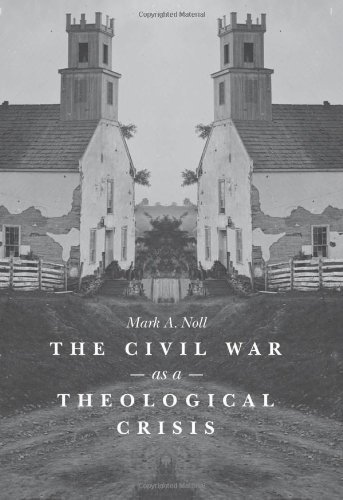
A Time to Embrace: Same-Gender Relationships in Religion, Law,
and Politics by William Stacy Johnson
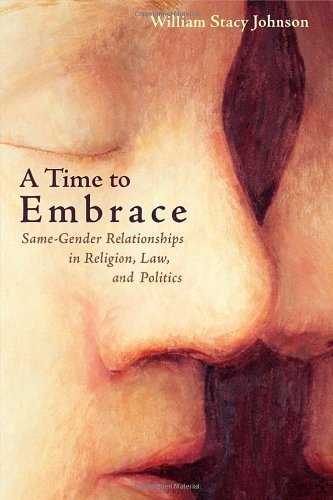
Celebration of Discipline: The Path to Spiritual Growth by
Richard Foster
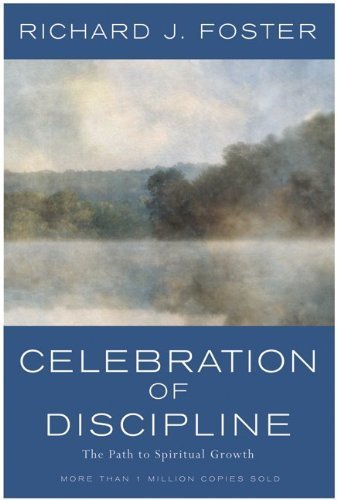
IRL…
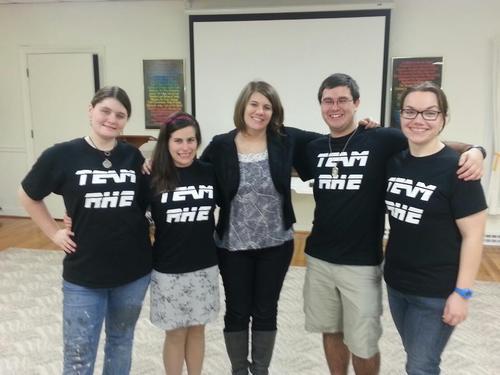
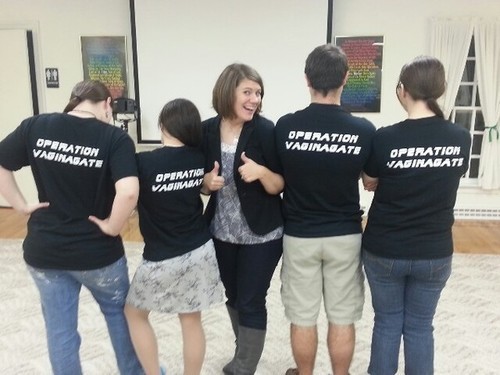
I had a wonderful time hanging out with the students of The
Wesley Foundation on the campus of The College of William & Mary. They
greeted me at the airport with t-shirts that said “Team RHE” on the front and
“Operation Vaginagate” on the back. They also gave me a gift basket of bread
and cheese from The Cheese Shop and lots and lots of chocolate…so we are
forever friends. Thanks for the warm welcome to Williamsburg!
Most Popular Post:
“40 Ideas for Lent: 2012”
Most Popular Comment:
In response to “Torn Chapters 12-13: Back to the Bible,” littlepanchuk wrote:
“While
I find arguments like Justin's quite compelling, I still find myself uncertain
about this issue. But what I think Christian heterosexuals, including myself,
need to remember is that we have a luxury that some of our fellow Christians
don't have. We can remain uncertain for as long as we need to. There is no
hurry to figure out the answer. While the question may be important to us
because we deeply care about our GLBTQ friends and family members, the answer
does not directly determine the course of our lives. For many Christians, it
does. It determines the choice to date, or not; to propose to the love of one's
life, or not; to commit to celibacy, or not. I don't think the gravity of the
question changes the truth of the matter (whatever it is), but I think it
demands that we react to our brothers and sisters conclusions with much grace,
realizing that we are not faced with that very difficult decision in quite the
same way.”
[The comment section after that post is definitely worth a read.
Fantastic. Thank you all for your contributions.]
***
on your blog? What’s happening in your LIFE?!



February 16, 2013
Next stop: Kentucky

Hey folks! So I'll be in Wilmore, Kentucky on Wednesday, February 20, speaking in chapel at Asbury University about my year of biblical womanhood. Chapel begins at 10 a.m. in Hughes Auditorium and is open to the public. This will be followed by a lunch and Q&A session. Learn more here.
Let me know if you'll be there! I'd love to say hello.
You can check out the rest of my winter/spring schedule here.



February 15, 2013
A message that made my day...

I received this message from Emily Simonson, a senior at Cascade Christian High School in Puyallup, Washington:
I read A Year of Biblical Womanhood a few months ago at the recommendation of my
female mentor. At first I was a little skeptical (the phrase “biblical
womanhood” can be a little alarming for any girl who’s been raised in the
Christian church) but now, I am incredibly glad she put the book in my hands.
For me, it was three hundred and fifty two pages of affirmation, which probably
explains why I shared it with those I thought would benefit from it: my best
friend, my Bible teacher, and inadvertently it seems, one of my best guy
friends. He overheard my teacher and me discussing the concept of “Eshet Chayil”
one day after class, and he asked to hear more. Though he hadn’t read the
book, he voiced his support of praising a woman for who she is, not what she
does. We talked about how sad it is that girls (and boys) are judged solely on
their performance, and how we hoped to be good examples to our underclassmen in
this area. This short, five-minute conversation occurred three months ago and
while it was profound, I naturally assumed he had forgotten all about it.
He hadn’t.
Today, over fifty senior
girls received carnations in various hues encouraging them to remember that
“charm is deceptive and beauty is fleeting; but a woman who fears the Lord is
to be praised” (Proverbs 31:30). None of us had any idea this would happen, and
as a carnation was placed on each desk, every girl’s face began with
bewilderment and transformed to joy. Eshet Chayil became the
buzz word of the day, and as girls discovered what it meant, they were
even more impressed by this random act of kindness. I came to find
out (mostly through coercion) that my friend had been the mastermind
behind the whole project: he picked out the flowers, got our teacher’s
approval, and recruited his fellow senior boys to help deliver them. There was
no ego involved; the boys simply wanted to humbly affirm their female
classmates and sisters in Christ. For many girls, Valentine’s Day normally
involves copious amounts of insecurity and anxiety, but instead I saw many
smiles as girls walked down the halls with their flowers. Today, women of
valor were honored by MEN of valor.
***
How cool is that? I think we should call these "valor flowers."
Thanks so much, Emily, for sharing this story.
Learn more about "eshet chayil" in A Year of Biblical Womanhood.
See also: "Women of Valor: It's About Character, Not Roles"



February 14, 2013
Torn, Chapters 12-13: Back to the Bible
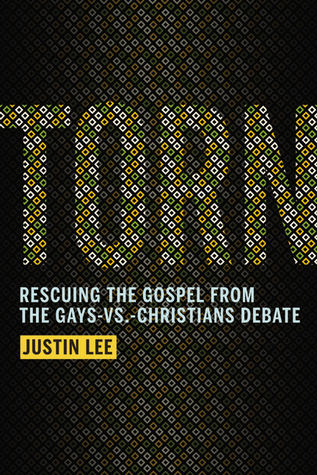
Today we continue our discussion of Torn: Rescuing the
Gospel from the Gays-vs.-Christians Debate. This has been one of our most
popular book discussions, so I’m sad to say we’ll be wrapping it up on Monday
with a final installment. But never fear! After that, it’s on to a shorter, 2-3
week discussion of Washed and Waiting by Wesley Hill.
I apologize for the irregular posting pattern. (We usually
have these discussions on Monday, but my travel load makes it hard to stick
with a schedule.) But today’s chapters are just too important to rush through,
as they focus on Justin’s wrestling with biblical texts that relate to
homosexuality.
“From the moment I knew I was gay,” writes Justin, “one
question had hung over me like a storm cloud: How did God want me to live?” (p.
168)
Justin said he combed through multiple books and
commentaries, struggling to discern what, if anything, the Bible said about
people like him—people who did no wish or plan to be gay, people who couldn’t
change their same-sex attraction through prayer or counseling, people who
wanted to faithfully follow Jesus no matter what. So Justin went on a quest: to reexamine the
biblical passages that relate to homosexuality to see what they might teach him
about how God wanted him to live.
For many who have already studied the subject, Justin’s
thoughts on the various biblical passages related to homosexuality will perhaps
be something of a repeat. The primary focus and function of Justin’s book is
his personal journey, not detailed biblical exegesis, so his analysis here is
brief but dense. Rest assured, we will be discussing these passages in more
depth in the future; but for now, Chapter 12 of Torn serves as a perfect introduction.
A common point of reference for those who say the Bible
condemns all forms of homosexuality is the Sodom story found in Genesis 19. The
assumption among many is that God destroyed the city because it was full of gay
people.
Justin points out that it’s not that clear.
[To brush up on the story, read Genesis 19.]
First of all, the Bible reports that “every man in the
entire city” surrounded the house and threatened the angels with gang rape, and
it is unlikely that every man in the city was gay. Second, the story of Genesis 19 is eerily
similar to a story found in Judges 19 about a male traveler who is threatened
with gang rape by an entire city and who throws his concubine to the crowd. (I
wrote about that troubling story in A Year of Biblical Womanhood.) Both stories
appear to serve as commentaries on the ancient Near Eastern concept of
hospitality. Justin points out that “rape had been used at times a s a symbol
of domination, with armies raping the (male) leader of a conquered
enemy…Clearly, in some cultures and contexts—whether in ancient times or in
modern-day prisons—male-male rape had been used or threatened as a method of
violent humiliation and domination.” Thirdly, in Ezekiel 16:49-50, God
identifies the sins of Sodom through the prophet Ezekial and says, “now this
was the sin of your sister Sodom: She and her daughters were arrogant, overfed
and unconcerned; they did not help the poor and needy. They were haughty and
did detestable things before me.” No specific mention of homosexuality.
“Clues like these,”
writes Justin, “combined with the Gibeah story, made it seem likely to me that
this was a story about a violent threat, not a story about a gay city. It
certainly wasn’t a story about consensual relationships.” (p. 172)
Justin then moves to Leviticus 18:22, which says, “Don’t lie
with a man as with a woman.” As others have noted, Leviticus 18-20 also
condemns shaving, wearing mixed fabrics, getting tattoos, sowing different
crops in the same field, and sexual activity during a woman’s period (back to A
Year of Biblical Womanhood!) so “clearly, just because something was condemned
for the Israelites in Moses’ day didn’t mean it was likewise condemned for
Christians today.” Justin cites scholars who believe this instruction likely
had something to do with cult prostitution, especially given the fact that the
rest of the passage is about keeping the Israelites separate from polytheistic
cultures.
Justin notes that even Robert Gagnon, one of the foremost
Bible scholars to argue for the traditional view (that gay sex is always a sin)
agrees. In The Bible and Homosexual Practice: Texts and Hermeneutics, Gagnon
writes:
I do not doubt that the circles out of which Leviticus 18:22
was produced had in view homosexual cult prostitution, at least partly.
Homosexual cult prostitution appears to have been the primary form in which
homosexual intercourse was practiced in Israel.
In spite of this evidence, Justin continued to wrestle with
the text: “If gay sex was being condemned for its connection to idolatry and
cult prostitution, that would explain the harsh punishment and the description
of it as ‘abomination,’ and it wouldn’t apply to modern-day relationships at
all. But if gay sex was being condemned because gay sex is inherently sinful in
all situations, then that condemnation would still apply today, even in a
committed relationship….I wasn’t going to solve this by looking at Leviticus in
isolation. I had to consider it in light of the New Testament.” (p. 178)
Before we discuss Romans 1:18-32, I highly recommend reading
it again in its full context or else our conversation here won’t make much
sense.
Justin acknowledges that “this passages was one of the few
passages in the New Testament to mention homosexuality, and it did so in a very
negative light.” It described people who had turned from God, refusing to give
God honor or thanks, choosing instead to worship idols. “God had responded by
giving them over to sexual immorality, resulting in their abandoning ‘natural’
(heterosexual?) sex in favor of committing ‘shameless’ acts with each other. At
the end of the passage, Paul listed some of the many sins these people were
involved in,” which include gossip, slander, envy, hate, disobedience to
parents, etc. (p. 179)
Once again, the context of this passage is paganism and idol
worship. In his research, Justin found
that “in Paul’s day, as in the time of Leviticus, some idol-worshiping cults
included sex (in some bizarre ways) as part of their worship rituals. Cult
temple prostitution, castration, and same-sex sex rites in honor of popular
goddesses were well-known practices at the time.” (p. 182) These sort of
practices, Justin notes, bear little resemblance to the committed same-sex
relationships being discussed and debated in the Church today.
Justin notes that Paul’s rhetorical strategy here is to
begin by talking about wicked people who had turned from God and gotten caught
up in all kinds of sins, only to turn the argument on his readers by declaring,
“Therefore you have no excuse, O man, every one of you who judges. For in
passing judgment on another you condemn yourself, because you, the judge,
practice the very same thing” ( Romans 2:1).
Justin concludes that “Paul’s entire point in this passage
was to show his audience that all of us are sinners in need of a Savior. The
idolaters who engaged in shameful sex rites were a perfect illustration for the
seriousness of turning from God, a way to get his audience agreeing with him
before he unexpectedly turned the tables on them.” (p. 183)
The struggle continued: “If this was about sex rites during
idol worship,” Justin writes, “that didn’t seem to have anything to do with
committed gay relationships. Even so, Paul’s view toward the same-sex aspect of
those rites didn’t seem very positive at all, and he did call the sex acts (as
the NIV put it) ‘shameful’ and ‘unnatural.’ Perhaps he would have condemned the
gay sex even if it weren’t in the context of idolatry…Then again, Paul also
calls it ‘shameful’ and ‘unnatural’—using the same Greek words—for a man to
have long hair (1 Corinthians 11:14). Most Christians today understand that
passage as referring to the cultural standards of that passage as referring to
the cultural standards of the time, and it has far fewer cultural references
that the Roman passage does. I could argue this either way, but the bottom line
was that this passage didn’t give me much guidance about how to live as a gay
Christian.”
The final passage to address some form of homosexuality is 1
Corinthians 6:9-11. Again, I recommend reading this passage in its entirety
before continuing.
In the passage, “homosexual offenders” are listed along with
idolaters, adulterers, male prostitutes, thieves, the greedy, drunkards,
slanderers, and swindlers as those who will not inherit the kingdom of God.
Justin notes that “searches through several reference books
taught me that ‘homosexual offenders’ was a translation of the Greek word
arsenokoitai,” a word whose meaning is hotly debated among scholars. “Normally,
scholars researching the meaning of a word in a particular passage look to
other uses of the same word in other writings from that era. In this case,
there are no other writings that use this word in Paul’s day or before Paul.”
Some scholars believe the passage refers to the Leviticus passage mentioned
before. Others believe the word arsenokoitai refers to adult males who had sex
with young boys—a common practice in Greek culture. Still others believe it
must refer to any gay sex whatsoever.
Justin describes his frustration:
“And so, it seemed, the entire Bible argument came down to
this one word. The Leviticus and Romans passages had a clear context of
idolatry, not committed relationships. If 1 Corinthians 6:9 was condemning the
same things, or something else like pederasty, then the Bible didn’t address
committed gay relationships at all, If arsenokoitai, however, was really a
reference to all gay sex in every time and place, then it shed light on the other
passages as well, and any other interpretation was just looking for loopholes.
I realized with frustration that neither answer was entirely satisfactory. I
could make a convincing argument for either side, but whatever argument I made,
how did I know I was right? If I got this wrong, I’d end up either trying to
justify sin or unjustly condemning loving relationships that God never intended
to condemn…I built both of these arguments in my mind, arguing them back and
forth with each other like Bobby Fischer playing both sides of a chess board.
Whichever way I argued, I always seemed to end up in a stalemate. (p. 187)
What I love most about Justin’s book is how relatable it is.
And his frustration with the lack of clarity from the biblical texts is perhaps
the most relatable part of his journey to me. But for Justin, the implications
of this confusion were far more personal and far more pressing.
In my opinion, this chapter is worth the price of the book.
In it, Justin makes the case for a hermeneutic of love as well as anyone I’ve
read, and his Christocentric approach to Scripture is one that can benefit all
Christians, regardless of how they interpret the passages discussed above and
regardless of where they stand on same-sex relationships. So please, even if
you disagree with Justin’s opinion on gay marriage, read this chapter for
yourself! It will help you work through some of those tricky passages of Scripture related to, for example, slavery and women.
Justin begins by acknowledging that “virtually all
Christians recognize that there are passages in the Bible that can’t be fairly
applied with only a superficial reading. We need context and interpretation,
and sometimes that means we need historical insight or other kinds of analysis
that comes only from a lot of study.” He points to passages like Titus 2:9
(“teach slaves to be subject to their masters in everything”), 1 Corinthians
14:34 (“women should remain silent in the churches; they should not speak…”),
and 1 Corinthians 11:6 (“if a woman does not cover her head, she should have
her hair cut off; and if it is a disgrace for a woman to have her hair cut or
shaved, she should cover her head”).
So how do we know which passages are limited by their
cultures and which ones still apply today?
To answer that question, Justin argues that we have to have
“a clear, consistent biblical standard for interpreting the text, a principle
we can apply to various passages that will help us to determine, fairly and
consistently, how to translate them for our culture…Such a standard would need
to be able to differentiate God’s eternal laws—such as those dealing with
murder, theft, and adultery—from the cultural biblical rules Christians are no
longer obligated to follow—such as those dealing with dietary restrictions and
head coverings.” (p. 195)
In search of such a standard, Justin finds Romans 13:8-10,
in which the apostle Paul writes this: “Let no debt remain outstanding, except
the continuing debt to love one another, for he who loves his fellowman has
fulfilled the law. The commandments, ‘Do not commit adultery,’ ‘Do not murder,’
‘Do not steal,’ ‘Do not covet,’ and whatever other commandment there may be,
are summed up in this one rule: ‘Love your neighbor as yourself.’ Love does no
harm to its neighbor. Therefore love is the fulfillment of the law” (emphasis mine).
Wow. Love is the fulfillment of the law.

This is in perfect keeping with Jesus’ response to the Bible
expert who asked him about the greatest commandment. Jesus said, “’You shall
love the Lord your God with all your heart, and with all your soul, and with
all your mind.’ This is the great and foremost commandment. The second is like
it, ‘You shall love your neighbor as yourself.’ On these two commandments
depend the whole Law and the Prophets.” (See Matthew 22:34-40).
Justin asks, “Was Paul [and Jesus] really saying that
whatever commandment there may be—every commandment from God, including but not
limited to the Big Ten—can be summed up in the rule to love one another? That
sounded a little to ‘hippie liberal’ for me. By that logic, couldn’t someone
use ‘love’ as an excuse to justify, for instance, cheating on their spouse with
someone more attractive?”
But then Justin learns that Paul was using the Greek word
agape, a term that connotes selfless, unconditional, sacrificial love, the kind
that seeks others’ good before one’s own. “That kind of love is the fulfillment
of God’s law, and according to Paul, it can be relied upon in any situation.”
(p. 196) Writes Justin:
“I considered this for a moment. If I truly love someone,
and I’m living in love toward that person, I wouldn’t kill them. I don’t need a
rule to remind me not to murder the people I love; living out my love for them
precludes me from doing it anyway. Similarly, if I’m living out God’s pure
agape love toward someone, I wouldn’t steal from them. Stealing is an
inherently unloving act. If I’m living in love toward my spouse, I wouldn’t
cheat on them. Cheating is selfish and unloving. If I truly love my brothers or
sisters, I wouldn’t cover the things they have; I’d be happy for them when good
things come their way. That’s what love is. If I were truly filled with God’s
perfect agape love, and if I could live that love out in every moment of my
life, I wouldn’t need ay other commandments written down, because I’d be
automatically doing all the right things. I thought about every example of sin
I could come up with. In every single case, Paul was right: Truly living out
God’s agape love for others always led to doing the right thing. Sin always
resulted from selfish desire in one form or another.” (p. 197)
Justin also points to Galatians 5:13-14, which reinforces
the Christian teaching that followers of Jesus are no longer bound by the Law
and says, “You, my brothers and sisters, were called to be free. But do not use
your freedom to indulge the sinful nature; rather, serve one another humbly in
love. For the entire law is fulfilled in keeping this one command: ‘Love your
neighbor as yourself.’”
“Here Paul exposes two theological extremes,” writes Justin.
“First, we are called to be free; we’re not bound by the rules and regulations
anymore, so the legalists are wrong. By the same token, we must not use that
freedom to indulge our selfish desires—our ‘flesh’—so the hedonists are wrong.
The middle way, the way of living out our freedom without sinning, is by
serving one another humbly in God’s agape love.” (p. 198)
As an example of this, Justin points to Jesus’ healing on
the Sabbath, which fulfilled the Law, not through the strict keeping of it, but
through love. Jesus, after all, is the example of what the Law—truly fulfilled—looks like. His example is our
clearest guide.
Justin also believes the Holy Spirit helps Christians
discern the purpose of God’s laws, guiding us in our interpretation and application
of them. For, as Paul put it, “if you are led by the Spirit, you are not under
the law.”
Justin applies this approach to the passages of Scripture
that seem to support slavery: “With these standards in mind, it became much
easier to interpret Scripture’s difficult passages consistently. Yes, there
were slaves in Bible times, but doesn’t selfless agape love demand their
freedom? Rules about head coverings and hair length had a purpose in Paul’s
culture, but if they have ultimate bearing on our commission to selflessly love
God and our neighbors, then, led by the Spirit, we can safely set them aside
today.” (p. 205)
Justin’s perspective here lines up beautifully with the
themes of many of the New Testament epistles in which the justification for
specific instructions (like head coverings and women remaining silent in
church, for example) appear to be rooted in practical considerations regarding
love for neighbor, considerations that clearly have a cultural context that may
not apply today. And so the general rule—“love your neighbor through behavior
that will not cause unnecessary strife”—may still apply, while the specifics—“cover
your head,” “remain silent”—may not.
(Once again, this is just the sort of ground we cover in A Year of
Biblical Womanhood.)
So what did this mean for the question of homosexuality?
“Undeniably, there were many types of homosexual behavior
that were driven by selfishness, not by agape love. Behaviors like rape, idolatry, prostitution, and child exploitation were all
clear examples of selfish, fleshly motivation, not love for God or others. They were sinful, and their bad fruit bore
that out. But suppose to people loved each other with all their hearts, and
they wanted to commit themselves to each other in the sight of God—to love,
honor, and cherish; to selflessly serve and encourage one another; to serve God
together; to be faithful for the rest of their lives. If they were of opposite
sexes, we would call that holy and beautiful and something to celebrate. But if
we changed only one thing—the gender of one of those individuals—while still
keeping the same love and selflessness and commitment, suddenly many Christians
would call it abominable and condemned to hell.” (p. 205)
This approach led Justin to conclude that he could no longer
condemn loving, committed, Christ-centered relationships based solely on
gender, particularly when he saw good fruit coming from many same-sex
relationships.
Justin says that until then, encouraging celibacy had always
seemed like the “safest” Christian position. But Pauls’ teachings on
circumcision changed that, for according to Paul, if Gentiles let themselves be
circumcised out of duty to the law, then “Christ will be of no value to you at
all” (Galatians 5:2).
“By that standard,” he concludes, “I realized there was no
‘safe side’ on this issue. If I supported gay relationships and was wrong, I
could be sinning by encouraging people to do something wrong, but if I opposed
gay relationships and was wrong, I would be sinning by putting myself and
others back under the law and making Christ ‘of no value.’” (p. 208)
***
Whew! We’ve covered a lot of ground for one post, so I’ll
leave it there. We’ll pick up the conversation in one final installment next
week.
In the meantime…your thoughts?
Does Justin make a goodbiblical case for supporting committed same-sex relationships or does it fall
short? Do you think the issue is clear-cut in Scripture or are you frustrated
by the ambiguity?
Please keep the conversation civil!



February 13, 2013
40 Ideas for Lent (2013)

As has become a tradition
here on the blog, I’ve compiled a list of 40 ideas that I hope will help you
make the most of this season of reflection, penitence, and preparation. This
year’s list includes many of your suggestions, which I gathered from the
comment section here. Thank you so much for your input and ideas! They made this year's list one of the best.
1.
When I wake up on Resurrection Sunday morning, how will I be different?
2. Is there a habit or sin in
my life that repeatedly gets in the way of loving God with my whole heart or
loving my neighbor as myself? How do I address that habit over the next 40
days?
3. Is there anyone in my life from whom I need
to ask forgiveness or pursue reconciliation?
4. From Osheta Moore: I read somewhere to begin
my Lenten fast with asking God what He wants me to "pick up" from Him,
and that will help me discern what I should "put down" for Him.
5. From Lynne Sykora Stadler: Our
family has tried to approach the Lenten season with "What will I add?” not
"What will I give up?” Things such as adding stillness in our lives (love
that idea, Natalie!). Adding more giving to those in need, what ever that might
be-time tutoring a child who needs help in school, giving food to a shelter or
food pantry, etc. Adding more prayer, more intentional time with God. The hope
is that prayerfully practicing something God leads us to add to our lives will
benefit others and keep our focus on Christ, not on ourselves.
[For more questions, check out last year’s list.]
10 Book Recommendations:1. Wondrous Encounters: Scriptures for Lent by Richard Rohr (submitted by Bet)
2. Lent for Everyone (Year C) by N.T. Wright (submitted by Sue)
3. Bread and Wine: Readings for Lent and Easter - Orbis Books
4. The Lenten Spring: Readings for Great Lent by Thomas Hopko (for Orthodox Lent, submitted by Molly Dodd)
5. The Road to Emmaus: Companions for the Journey Through Lent by Helen Julian CSF (submitted by Megan Clark Gil
6. Fasting: Spiritual Freedom Beyond Our Appetite by Lynne Baab (submitted by Lamati)
7. Seven Sacred Pauses: Living Mindfully Through the Hours of the Day by Macrina Wiederkehr (submitted by Dana Holz Pavuk)
8. Show Me The Way: Daily Lenten Readings by Henri Nouwen
9. The Little Way of Lent: Meditations in the Spirit of Therese de Lisieux (submitted by Sandy)
10. Celebration of Discipline: The Path to Spiritual Growth by Richard Foster
20 Fasts/ Disciplines/ Rituals:1. Participate in an Ash Wednesday service.
2. Pray
the offices for 40 days. The
Daily Office, (or the Divine Hours), consists of four times of prayer each day:
morning prayers (Matins/Laudes), midday prayers (Sext), evening prayers
(Vespers), nighttime prayers (Compline). I love praying the hours, and for Lent
this year, I’d like to try to get into a more consistent schedule, at least
sticking to morning and evening prayers, no matter what. If it’s your first
time praying the hours, I recommend using Phyllis Tickle’s The
Divine Hours.
If you’re looking to add something new to your prayer schedule, I
recommend A Book of Hours by Thomas Merton or Common Prayer: A Liturgy for Ordinary Radicals by
Shane Claiborne, Jonathan Wilson-Hartgrove, and Enuma Okoro.
3. From MamaNym: This year I'm writing 40 Lenten Love Letters to
people who have had a big impact on my life, both in the present, and in the
past, including some people who don't like me and some who have passed
away...and especially to God, and even one to myself (which seems to be the
most difficult for me to begin).
4. Take the 40 Days of Water
challenge from Blood: Water Mission to help bring clean water to Uganda. Give
up all beverages except for water for the 40 days of Lent 2012 and donate the
money you save to Blood: Water Mission. They have a great Web site through which you can track your progress
and learn more.
5. For families with children: Make a thorn
wreath with your family. (submitted by Julie Ball). Or Institute a Way of Light wreath or an Easter Tree (via Ann Voskamp) You may also want to check out this fantastic list of Lent ideas for families, which includes eating fish sticks on Fridays, making paper chains, donating, and keeping a gratitude jar.
6. From Natalie
Trust: This year I plan to practice intentional silence and stillness
every evening. I wrote more about it on my blog and will reflect over the whole
experience weekly. Two years ago I wore black for the entire Lenten season as a
symbol of my grief over the death of our Lord, and I also wore black in
solidarity for the suffering that is experienced in this world by so many
people.
7. From Bethany: A few years ago, I gave up NPR for Lent. It
was a huge challenge--NPR is almost always on at my house, and especially in
the car. Because suddenly I had silence in my day, I had to face myself and my
anxieties, and I found myself praying more. I'm not sure it's a fast I'll
repeat, but it definitely taught me a great deal about making space in my life.
8. From Marla Abe: Practice “The Wilderness Way”: Every day for 40 days, spend 10-20 minutes
OUTSIDE in prayer/meditation/just being (rain or shine)!
9. Participate in a Carbon Fast (submitted by (Shems)
10. From Aric Clark: Last year I tried to give
away 40 things I don't need for Lent. Each day I went through my closet,
through my book & DVD collections etc and picked something I don't need and
found someone to give it to. I found it meaningful.
11. From leeaprice: Idea for a discipline - Fully observe the Sabbath for Lent, from sundown on Friday through Saturday.
12. From Eric Fry: A daily Lectio Divina and
meditiation on the Imago Deiwill be my Lenten practice this year.
13. From
Ariel Price: This year I'm giving up reading books, except the Bible. Since one
of the goals of Lent is to prepare ourselves for the Kingdom of God, I can
think of no better way to do that than to immerse myself in Scripture.
14. From Beth: I fasted from using my debit card last year. It
allowed me to become painfully aware of how easily I swipe & waste; and,
allowed me to meditate on & act with better stewardship.
15. From Aubrey: I'm going to be eating like my Compassion child
eats every night at dinner and reading "One Thousand Gifts" by Ann
Voskamp. I will donate the money I save on groceries. Trying to get in the
spirit of "true" fasting from Isaiah.
16. From Carter McNeese: A couple of years ago I stumbled onto something that I have
really liked that I am extending this year. There is a tradition in Irish
Christianity of taking pilgrimage to Crough Patrick in County Mayo and hiking
to the top barefoot. The last few years I have taken my own
"pilgrimage" during Holy Week by going shoeless as a reminder of not
only all of those that are denied shoes, but just how hard it is to "walk
the walk." It has been a practice that has been very rewarding to me (and
a great conversation starter!). It is also always funny to see people's
reaction when you are dressed in suit and tie and barefoot. You can watch their
minds melt! This year I think that I
am expanding it to the rest of Lent. Twice a week I will both go shoeless as
well as fast from sunrise to sunset. I am going to have to be flexible about
the days of the week that I do this as I have a job where shoes are, well,
required and I can't afford to loose my job! When Holy Week rolls around, the
practice will be expanded to everyday, with exceptions that I will wear shoes
while I am "on the clock" at work. If you have any interest in doing this might I recommend
carrying a pair of flip-flops with you when you go places. While I have been
able to talk a fair number of Grocery store managers over the years into
letting me be (they have a tendency on letting me alone when I say
"pilgrimage") some have been insistent.
17. From Megan: My all-time
favorite Lenten discipline that I've done is read the Chronicles of Narnia during
the course of the season I think it's important to do something that is both
challenging and enjoyable so you do not resent the season.
18. Traditionally,
Christians abstained from eating meat during Lent, so consider joining millions
of Christians around the world in this fast. It’s a great way to feel connected
to the historical, worldwide church.
19. Commit to memorizing a
significant portion of Scripture, like the Sermon on the Mount, or Isaiah 58,
or (one of my favorites) 1 John 4. One reader also suggested The Magnificat.
20. Commit to 40 days of praying for your enemies. And I don’t mean ruminating over all they have done wrong and praying that they will change, but praying that they will be blessed, that they will find health and peace and grace, that they will come to know Jesus or experience the love of Christ more fully.
1. Psalm 51
3. "O Lord and Master of my
life, grant not unto me a spirit of idleness, of discouragement, of lust for
power, and of vain speaking. But bestow upon me, Thy servant, the spirit of
chastity, of meekness, of patience, and of love. Yea, O Lord and King, grant
that I may perceive my own transgressions, and judge not my brother, for
blessed art Thou unto ages of ages. Amen." (prayer
used during Great Lent in the Eastern Orthodox Church, submitted by Bryan Michael Maes)
4. "Keep watch, dear Lord, with those who work, or watch,
or weep this night, and give your angels charge over those who sleep. Tend the
sick, Lord Christ; give rest to the weary, bless the dying, soothe the
suffering, pity the afflicted, shield the joyous; and all for your loves sake.
Amen." (Book of Common Prayer, submitted by Jacqui Buschor)
5. It is my Lent to break my Lent,
To eat when I would fast,
To know when slender strength is spent,
Take shelter from the blast
When I would run with wind and rain,
To sleep when I would watch.
It is my Lent to smile at pain
But not ignore its touch.
It is my Lent to listen well
When I would be alone,
To talk when I would rather dwell
In silence, turn from none
Who call on me, to try to see
That what is truly meant
Is not my choice. If Christ’s I’d be
It’s thus I’ll keep my Lent.
-Madeleine L’Engle (submitted by Tara M. Owens)
[Find more
prayers/mediations in last year’s list]
Wishing you all a meaningful Lenten journey!.
***
See also:
40 Ideas for Lent 2012
40 Ideas for Lent 2011
40 Ideas for Lent 2010



February 12, 2013
Ask Shane Claiborne...

We've been hosting our "Ask a..." series for more than a year now, and today I'm excited to introduce a new incarnation of the series in which you get to interview some of today's most fascinating people. I can think of no better way to start than with Shane Claiborne, a brother in Christ I have long admired.
Shane Claiborne graduated from Eastern University and did graduate work at Princeton Seminary. In 2010, he received an Honorary Doctorate from Eastern. His adventures have taken him from the streets of Calcutta where he worked with Mother Teresa to the wealthy suburbs of Chicago where he served at the influential mega-church Willow Creek. As a peacemaker, his journeys have taken him to some of the most troubled regions of the world – from Rwanda to the West Bank – and he’s been on peace delegations in Afghanistan and Iraq.
Shane is the visionary leader of The Simple Way, a faith community in inner city Philadelphia that has helped birth and connect radical faith communities around the world. He is married to Katie Jo, a North Carolina girl who also fell in love with the city (and with Shane). They were wed in St. Edwards church, the formerly abandoned cathedral into which homeless families relocated in 1995, launching the beginning of the Simple Way community and a new phase of faith-based justice making. where everything started back in 1995.
Shane writes and travels extensively speaking about peacemaking, social justice, and Jesus. Shane’s books include Jesus for President, Red Letter Revolution, Common Prayer, Follow Me to Freedom, Jesus, Bombs and Ice Cream, Becoming the Answer to Our Prayers – and his classic The Irresistible Revolution. He has been featured in a number of films including “Another World Is Possible” and “Ordinary Radicals.” His books are translated into more than a dozen languages. Shane speaks over 100 times a year, nationally and internationally.
His work has appeared in Esquire, SPIN, Christianity Today, and The Wall Street Journal, and he has been on everything from Fox News and Al Jazeera to CNN and NPR. He’s given academic lectures at Harvard, Princeton, Brown, Liberty, Duke, and Notre Dame. Shane speaks regularly at denominational gatherings, festivals, and conferences around the globe.
You know the drill. If you have a question for Shane, leave it in the comment section. Be sure to utilize the "like" feature so we can get a sense of what questions are of most interest to you. After 24-hours, I'll pose seven of the most popular questions to Shane and post his responses next week. Ask away!



February 10, 2013
Sunday Superlatives 2/10/13
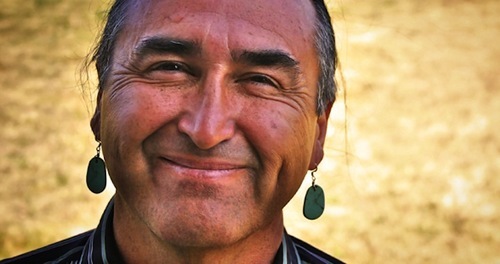
Richard Twiss
Prayer of the Day: “O God, who before the
passion of your only begotten Son revealed his glory upon the holy mountain:
Grant to us that we, beholding by faith the light of his countenance, may be
strengthened to bear our cross, and be changed into his likeness from glory to
glory; through Jesus Christ our Lord, who lives and reigns with you and the
Holy Spirit, one God, for ever and ever. Amen.” (Book of Common Prayer)
Today we
also remember in prayer the friends and family of Richard Twiss, who passed into the eternal
kingdom of the Creator this week after a massive heart attack. I do hope you
will take the time to read this collection of tributes over at Red Letter
Christians. As Jarrod McKenna put it, “Uncle
Richard called us to the Creator’s great powwow, around the throne of the
nonviolent Lamb, in whose reign every nation and tribe and people and language
are present, protected and celebrated.” He will be profoundly missed.
Best Video:
A Pep Talk From Kid President
Best Sermon:
Jonathan Martin with “The Woman at the Well”
Best Reflection:
Richard Beck with “This
Ritual of Hallowing”
“Imagine someone comes to you and shares a great burden. They
share loss, failure, despair, fear, brokenness, or sickness. Their own or that
of someone they love. What do you say upon listening? Thanks for sharing? Good
luck with all that? I'm so sorry? Something has happened, something was shared, that needs to be set
apart from every other mundane and silly thing that has happened
during the day. The moment needs to behallowed--set apart, consecrated,
made holy. And so you pray. Prayer is a
hallowing… Do I believe God is out there answering all these petitions and
requests? Again, I don't know. But I know that prayer--this ritual of
hallowing--is the only proper response."
Best Story:
Jeff Chu with “Damsel, Arise: A Westboro Scion Leaves Her Church”
“I don’t feel confident at all in my beliefs
about God. That’s definitely scary. But I don’t believe anymore that God hates
almost all of mankind. I don’t think that, if you do everything else in your
life right and you happen to be gay, you’re automatically going to hell. I
don’t believe anymore that WBC has a monopoly on truth.”
Best Insights:
Derek
Leman with “How Torah Undermines the Very Slavery It Permits”
“If you’d like to see a
Christian theologian tackling the idea of understanding the Bible as more than
what is written, of taking a relational approach to the Bible and reading it
with tradition, instead of insisting on an unchanging, literal text, take a
look at Scot McKnight’s The Blue Parakeet. If you’d like to see
a Jewish concept of Torah as adapting and changing over time, being read in
community and through tradition, and not as an unchanging, literal text, then
simply start reading Jewish literature. Because Judaism is very straightforward
about Torah including tradition and being a conversation that evolves over time
toward God’s ideal ways in the world to come.”
Best Analysis:
Jenny Rae Armstrong with “John Piper, Women in Combat, and How Gender Roles
Fall Short of the Glory of Humankind”
“When we force people into
gender-based boxes, insist that individuals conform to our concept of what men
and women are supposed to be, we lose the wonder, the mystery, and the
full-orbed expression of God’s image uniquely revealed in each human being. God created us male and female, yes,
but He didn’t just create us male and female; he created us Jenny and Aaron,
and Jason and Sarah, and John and Noel. All of us reflect God’s image in
different ways. And it is very good. Here’s
what it comes down to for me. My
gender is not something I perform; it is something I am. Womanhood is not
something I do; it is something I live. Femininity does not define me; as a
woman created in the image of God, I define it, in community with my sisters.”
Best Contribution to the
Purity Culture Conversation:
Leigh Kramer with “The
Morning After”
“I am a woman. Not
being a wife or mother does not make me less of a woman. My sexuality is not
defined by those roles. Nor am I defined by my virginity or my past. I am a
unique blend of beauty, character, and imperfection. I am enough. I have tasted
my power, I have chosen chastity, I have learned what lies behind these
desires. There's nothing passive now in this decision to wait. But this is just me. This is the path best suited for me. I did
not always choose it. I understand why many go another way…There is
no condemnation here. Simply a plea. Stand beside me, encourage me. Challenge
me but don't judge me. Even if you didn't make the same choice, even if you
think you'd never make the same decision. No matter what I have or
haven't done, I am worthy of love. And so are you.”
Most Challenging:
Micha Boyett with “Real
Failure, Or Why All of It Matters”
“What makes something valuable? What makes anything in this
tender and cracked world more important than anything else? I am called to a
spiritual work that runs deep and fine. Your calling may be wide. You may dig
the wells that save the lives of thousands. Or you may lift the small plastic
cup to the one mouth in your care. You may be doing the great work I dreamed of
once, the brave work in the most broken places. But, you may also be living the
most ordinary kind of life: one of laundry and dishes and children who scream
at your attempts to raise them well. All of us are knit into the fabric of
Christ; all of us are living in holy time.”
Most Refreshing:
Addie Zierman with “Come Weary”
“Come
straight from your bed with your morning breath and your sweatpants. Come with
your crazy-hair and your unwashed face and last night’s dishes still sitting
out on the counter. Come as soon as the alarm goes off, or after three or four
smacks at the Snooze button.”
Most Provocative:
Andrew Sullivan with
“Christianism and Violence”
“This man is now a symbol for “pro-family” and “pro-gun”
Republicanism. And yet he had no property to defend, no wife to protect, no
children to keep safe, no house to live in. He never carried a weapon and
rebuked his friends when they used one against a mob armed with clubs and
swords about to arrest and torture him to death. He was homeless, completely
dependent on the good will, shelter and food of others. He was, as today’s
Republicans would say, a “taker”. But of course, it is in giving that you
receive in Christianity. Jesus inverted the entire maker-taker paradigm. So no,
congressman Ryan, you cannot be a disciple of Ayn Rand and Jesus
of Nazareth. In any way whatsoever.”
Most Encouraging (nominated
by Micah Odor):
Anil Dash with “The World is Getting Better”
“But let's, for once, look at the actual data around developing world problems. Not our condescending,
world-away displays of emotion, or our slacktivist tendencies to see a retweet
as meaningful action, but the actual numbers and metrics about how progress is
happening for the world's poorest people. Though metrics and measurements are
always fraught and flawed, Gates' single biggest emphasis was the idea that
measurable progress and metrics are necessary for any meaningful improvements
to happen in the lives of the world's poor. So how are we doing?”
Most Profound:
Elizabeth Esther with “Five Year Old Theology”
“I know God loves everybody and that is most importantest
thing of all the things I know.”
Most Thought-Provoking:
Morgan Guyton with “Is Jesus Saving the World From Us?”
“The fear of the Lord
is described all over the Bible as a positive thing. Proverbs 9:10 says the
fear of the Lord leads to wisdom. Psalm 19:9 says the fear of the Lord is pure
and endures forever. Acts 9:31 says
that the new church grew because of their fear of the Lord and confidence in
the Holy Spirit. Isaiah 11:3 says
that the messiah will delight in the fear of the Lord. Many evangelicals seem
to think that the Bible’s praise for the fear of the Lord means that it’s good
to be afraid of God. But being afraid of God is
paradoxically the opposite of the fear of the Lord that gives you purity,
confidence, and wisdom. When you’re afraid of God, you hide in the bushes like
Adam and Eve when God comes walking. You become like the third servant in the
parable of the talents who said to his master, “I knew that you were a harsh
man… so I was afraid, and I went and hid your talent in the ground. Here you
have what is yours” (Matthew 25:24-25)…. The fear that predominates so much of the
evangelical church is actually the fear that 1 John 4:18 is talking about in the negative: “There is no fear in love, but perfect
love casts out fear; for fear has to do with punishment, and whoever fears has
not reached perfection in love.” I would call this fear dread, because is a fear that hides from God. The
good fear of the Lord doesn’t hide from God; it rather describes the inherent,
inescapable speechlessness we experience when we come in contact with God’s
infinite. This good fear is best described as wonder.”
Most Eye-Opening:
“A Country Divided: Stunning Photographs Capture Lives of Ordinary Americans
During Segregation…”
Most Powerful:
Idelette McVicker with
“My freedom is bound to yours”
“The girls didn’t need us for their
liberation. But we were all becoming a little more liberated together.”
Most Likely To Take You Back:
Buzzfeed with “29 albums that are now 20 years old”
Most Likely to Make You
Cheer:
Preston
Yancey with “When we need women behind the pulpits”
P ut a woman
behind the pulpit so I can hear the words of God in a new voice. Put a woman
behind the pulpit so I can hear what it’s like for Mama Mary to watch her Son
bleed. Put a woman behind the pulpit so I can hear He is risen! in the tone
it was first shouted. Put a woman behind the pulpit so I can see that the
kingdom of God is bigger than my expectations. Put a woman behind the pulpit so
I can see that the Church is opposed to the systemic sexism of Satan’s world.
Put a woman behind the pulpit so I can see that breasts and long legs and high
heels do not scare God. Put a woman behind the pulpit so I can know that
through Christ He has done, is doing, and will do something new. Put a woman
behind the pulpit so I can know that this long line of Faith handed-down came
from Mothers and Fathers. Put a woman behind the pulpit so I can know that Aslan is on the move and He’s setting captives free and
He’s singing with a
roar…”
Best Reminder:
Michael Kimpan at Red Letter Christians with “Don’t
Tell Anyone – Jesus’ warning Against Always Expressing Right Belief”
“Our
addiction to an answer culture dictates declarations of ‘Truth’ so individuals know
what we believe - and we
quickly become defined not by what we are for, but what we are against. We
tragically live not as who we
are, but become obsessed with correcting who
we are not for fear of being
misunderstood. Jesus didn’t seem to care. It’s not
that he was unaware of who He was – nor did He shame Peter for his
Spirit-guided insight into declaring his affirmation of Christ’s claims of
divinity. Yet it would seem it mattered less to Jesus what people believed about Him than it did that they follow Him and experience His way
of life.”
Most
Relatable:
Shauna Niequist with “Anti-Frantic”
“I’mOn the Blog…
adopting a ruthless anti-frantic policy. I’m done with frantic. The new
baseline for me: will saying yes to this require me to live in a
frantic way? I’m saying no more often than I’m saying yes. I’m
asking hard questions about why I’ve kept myself so busy all these years. The
space and silence I’m creating is sometimes beautiful and sometimes
terrifying. Sometimes I feel like I’m in a cartoon airplane when the
engine gets cut and the plane hovers for a few long seconds before starting to
fall. But then sometimes I feel so strongly like for the first time in a long
time, I’m listening to the right voices. I’m remaking my way of living from the
inside out.”
Most Popular Post:
The Absurd Legalism of Gender
Roles
***
So, what caught your eye online this week? What's happening on your blog?



Rachel Held Evans's Blog
- Rachel Held Evans's profile
- 1710 followers



